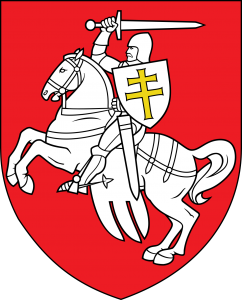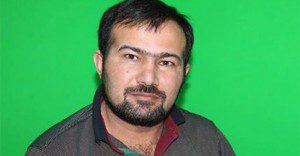11 Sep 2019 | Belarus, Belarus Incident Reports
[vc_row][vc_column][vc_column_text]
Index on Censorship’s Monitoring and Advocating for Media Freedom project tracks press freedom violations in five countries: Azerbaijan, Belarus, Russia, Turkey and Ukraine. Learn more.
[/vc_column_text][/vc_column][/vc_row][vc_row][vc_column][vc_row_inner][vc_column_inner][vc_custom_heading text=”4 Incidents” use_theme_fonts=”yes”][vc_column_text]
Journalist covering protests in Brest receives messages with threats
21 August 2019 – Journalist Nasta Zakharevich, who has been reporting on the construction of a controversial battery factory located in Brest, received insulting messages and a veiled threat from an account on VKontakte social network.
The VKontakte account is known for often leaving harsh and rude comments under posts authored by opponents of the plant. Earlier an individual with the same name and surname as the VKontakte profile that made the comments had filed a complaint with the police against ecological activist Dzmitry Bekalyuk, who is an opponent of the plant. The compliant accused accused Bekalyuk of “discrediting the Republic of Belarus.”
Link: https://charter97.link/en/news/2019/8/21/345601/
http://greenbelarus.info/articles/21-08-2019/zhurnalistka-kotoraya-pishet-pro-zavod-akb-v-breste-poluchila-soobshcheniya-s
Categories: Online Defamation/Discredit/Harassment/Verbal Abuse, Intimidation
Source(s) of violation: Known private individual(s)
State-run newspaper concealed opposition symbol on photo

Coat of arms associated with Belarusian opposition. It was previously the country’s coat of arms in 1918 and from 1991-1995. (Photo: Wikipedia)
15 August 2019 – Adzinstva, the local state-owned newspaper in Barysau, altered a photo published on its website of sports coach Viktar Zakharjeu to hide the previous state emblem of Belarus Pahonia, which is regarded by the authorities as an opposition symbol.
Pahonia was the official emblem of the Belarusian Democratic Republic in 1918 and of the Republic of Belarus from 1991 to 1995. It was abolished after Alexander Lukashenko became the country’s president, though it is not officially prohibited and is included on the Republic of Belarus’ cultural heritage list.
Links: https://baj.by/be/content/barysauskaya-rayonka-adzinstva-zamazala-pagonyu-na-svitshoce-geroya-intervyu
http://www.edinstvo.by/ru/news/obshchestvo/item/9153-borisovchanin-stal-pervym-trenerom-v-belarusi-po-krossfitu-v-invalidnoj-kolyaske?fbclid=IwAR3Z1yq6x92K-ZtxfF2DdNn1CY33vQVCCzVTwTZ95e6npWOzB2XDVsbCPh0
Category: Censorship
Source(s) of violation: Employer/Publisher/Colleague(s)
Regional government official refused to provide information on communicable disease
14 August 2019 – An official for the Brest regional government refused to provide information on a case of anthrax in the Stolin district to Aksana Brovach, a journalist working for the newspaper Komsomolskaya Pravda v Belarusi.
The official said that all the information was available from on the state-run news agency BelTA: “Can you read? How is it written there?”
The press-service of the Ministry of Agriculture and Food only published an official announcement about the anthrax case on the BelTA news agency.
Link: https://baj.by/be/content/usya-infarmacyya-na-belta-u-bresckim-ablvykankame-admovilisya-davac-kamentar-nakont-vypadku
Category: Blocked Access
Source(s) of violation: Government/State Agency/Public official(s)/Political party
After accusations, local independent news outlets investigated by police
13 August 2019 – Ivan Sukharevich, a resident of the town of Drahichyn in the Brest region, sent letters to the National Assembly of Belarus and to the news website Piershy Rehijon editor-in-chief Piotr Huzajeuski. In the letters, Sukharevich expressed his negative attitude to this online media outlet and particularly to its Drahichyn correspondent Siarhei Hardzijevich.
The writer warned of the serious consequences for the Piershy Rehijon if its journalists try “to shake up the community of our town and region” on the eve of the parliamentary elections and demanded to bring Hardzijevich to responsibility.
Accusations of lying are mentioned many times in the letter, but no evidence was provided for the accusations.
Sukharevich’s complaint was sent to the Drahichyn district police department to be investigated. Hardzijevich got a written response from the police that no evidence of illegal activity had been found.
Link: https://1reg.by/2019/08/13/drogichinskiy-pravdorub-pozhalovalsya-v-parlament-na-korrespondenta-pershaga-reg-yonu/
Categories: Offline Defamation/Discredit/Harassment/Verbal Abuse
Source(s) of violation: Known private individual(s)[/vc_column_text][/vc_column_inner][/vc_row_inner][/vc_column][/vc_row][vc_row][vc_column][vc_basic_grid post_type=”post” max_items=”4″ element_width=”6″ grid_id=”vc_gid:1567416168666-b6a972c4-0bc2-10″ taxonomies=”8996″][/vc_column][/vc_row]
6 Aug 2019 | Ukraine, Ukraine Incident Reports
[vc_row][vc_column][vc_column_text]
Index on Censorship’s Monitoring and Advocating for Media Freedom project tracks press freedom violations in five countries: Azerbaijan, Belarus, Russia, Turkey and Ukraine. Learn more.
[/vc_column_text][/vc_column][/vc_row][vc_row][vc_column][vc_row_inner][vc_column_inner][vc_custom_heading text=”9 Incidents” use_theme_fonts=”yes”][/vc_column_inner][/vc_row_inner][vc_column_text]
Female journalist reports being followed
 30 July 2019 — Oksana Sokolova, a ICTV TV channel presenter, reported being followed by unknown persons, the Institute of Mass Information reported.
30 July 2019 — Oksana Sokolova, a ICTV TV channel presenter, reported being followed by unknown persons, the Institute of Mass Information reported.
“Am I Being followed again? Recently, I noticed that every time I have a meeting at a cafe, a young man is seated at a nearby table and looks intently at the phone screen without ordering anything,” Sokolova was quoted as saying on the ICTV Facebook page. She said that she would not have paid attention to these situations if she hadn’t been trailed in the past. Sokolova was forced to take a personal guard due to phone threats in 2014. A criminal case was opened by the police and the individual making threats was identified.
“I didn’t think I would have to contact the authorities again,” the TV presenter said about the latest incidents. She told ICTV that the individuals following her in recently have all been different but they behave in the same way.
Sokolova said she intends to file a complaint with the police.
Link(s): https://www.facebook.com/Fakty.ICTV/photos/a.141306902606734/2860449097359154/?type=3&theater
https://imi.org.ua/news/televeducha-ictv-oksana-sokolova-zvernet-sia-do-pravookhorontsiv-cherez-stezhennia-za-neiu/
Categories: Intimidation
Source of violation: Unknown
Court blocks access to two dozen websites
23 July 2019 — Pechersk District Court of Kyiv blocked access to Enigma.ua, a blogging platform and nearly 20 other websites, according to Detector Media.
In a statement, Enigma.ua, the site was blocked because of a published article that explored the connections between law enforcement and organised crime groups in targeting human rights defenders in the country. The court made its decision after a motion by prosecutors who are investigating a criminal case which the article addressed.
The National Commission for the State Regulation of Communications and Informatization (NCCIR) reported that Pechersk District Court of Kyiv decided to block such sites as http:// go338.top, https://trident-ua.info, https://enigma.ua, https:blogs.korrespondent.net, http://seychas.press, http://www.netadvocate.org, https://compromat.ws, https://compromat.ws, https://sled-net-ua, http://ua-24.com, http://moscow-post.press, https://novindoosh.com, http://www.stalker-world.net, http://rospres.press, https://informator.news, http://ustav.press, http://www.ukrpress.info, http://www.stalker-world.net. Internet service providers of Ukraine must comply with the decision to block.
“We have already appealed to the lawyers and through court we will overturn this ruling and demand penalties for those who choose to block sites through a criminal case that has nothing to do with the resources and their owners,” said in a statement of Enigma.ua.
UPDATE: 2 August 2019 — An appeal was filed against the decision of the Pechersk District Court of Kyiv to block 18 information sites, IMI reported.
The interests of Enigma.ua website owner Volodymyr Pasika are represented by media lawyer Olexandr Burmahin, who is also the Human Rights Platform executive director. Digital Security Lab lawyers also joined to prepare the legal position in the case.
Burmahin said blocking of websites was a very dangerous precedent for freedom of speech and the dissemination of information online.
Link(s): https://imi.org.ua/news/oskarzheno-blokuvannia-nyzky-saytiv-za-rishenniam-pechers-koho-sudu/
https://detector.media/infospace/article/169446/2019-07-31-sud-zablokuvav-dostup-do-platformi-dlya-blogeriv-enigmaua/
https://enigma.ua/articles/bezpretsedentniy-nastup-na-svobodu-slova-v-ukraini-zablokovano-desyatki-nezalezhnikh-saytiv
https://nkrzi.gov.ua/index.php?r=site/index&pg=99&id=1749&language=uk
Categories: Subpoena / Court Order/ Lawsuits, Legal Measures
Source of violation: Government/State Agency/Public official(s)/Political party
Politician sues Novoe Vremya weekly magazine
30 July 2019 — Politician Viktor Medvedchuk, the head of the political party Opposition Platform – For Life, sued Novoe Vremya weekly magazine, NV.ua reported.
The case of “protection of honour, dignity and business reputation and refutation of false information” will be considered by the Podil district court of Kyiv. The editorial board said it doesn’t have information which article prompted the politicians lawsuit.
Link(s): https://nv.ua/ukr/ukraine/events/medvedchuk-podav-do-sudu-na-nv-novini-ukrajini-50035068.html
Categories: Subpoena / Court Order/ Lawsuits
Source of violation: Government/State Agency/Public official(s)/Political party
Press center attacked by far right activists, five people injured
30 July 2019 — About a dozen right-wing activists from Tradition and Order, a nationalist group, assaulted participants of a press conference and press center staff at the news agency Ukrinform in Kyiv, Hromadske reported.
The press conference was held by Serhiy Koshukov and Andriy Aksyonov, who are running for deputies in a single-member constituency number 50. At the beginning of the press conference, Koshukov said that about 500 votes had been stolen from him at the previous parliamentary election. After that, the press conference was interrupted by the attackers.
According to Interfax-Ukraine news agency, more than 10 people wearing t-shirts with “Tradition and Order” logos broke into the room. They smashed the glass in the room, broke the door, threw eggs at the press conference participants, poured water on those present at the press center, shouted “Down with the separatist Aksyonov.”
The far-rightists accused Aksyonov of being a citizen of the Russian Federation. Aksenov, in turn, claimed that he never had a Russian passport.
The police arrived about 20 minutes after the beginning of the assault. But the officers didn’t take any action, only observed what was happening, Interfax-Ukraine reported. In the presence of the police, the right-wing activists threw eggs at Aksyonov and unscrewed microphones. After that they left the premises shouting “Put Aksenov behind bars” and “Shame”. A police officer tried to draw up a protocol against one of them, but in response the far-rightist insulted the police and left.
According to the National Union of Journalists of Ukraine, five news agency employees asked for medical help as a result of the attack. Ukrinform employee Roman Hrabrov was assaulted from behind and roughly grabbed by the shoulder. Three far-rightists simultaneously assaulted press center employee Pavlo Negrey, beating him on his legs, back, face, head, and choking him. The assault left him with a trauma of his left eye and numerous bruises all over his body.
The names of other news agency staff affected by the attack were not disclosed.
According to preliminary estimates, material damage to Ukrinform press center exceeded 17,500 euro.
The National Union of Journalists of Ukraine condemned the brutal attack on the staff of the leading news agency, and demanded severe punishment for the assaulters.
UPDATE: 1 August 2019 — The Kyiv police called the incident at Ukrinform “hooliganism”, IMI reported. On 30 July two of the invaders were taken into police custody to testify. The police also took the records from the CCTV cameras, the National Police reported.
UPDATE: 2 August 2019 — President of Ukraine Volodymyr Zelensky said it was necessary to investigate and severely punish the people who took part in the assault on Ukrinform.
Link(s):
https://imi.org.ua/news/zelens-kyy-pro-napad-na-ukrinform-treba-duzhe-zhorstko-karaty/
https://kyiv.npu.gov.ua/news/xuliganstvo/podiji-u-budivli-ukrinformu-slidchi-stolichnoji-policziji-kvalifikuvali-yak-xuliganstvo/
https://hromadske.ua/posts/u-kiyevi-na-pres-konferenciyu-shodo-50-go-okrugu-uvirvalisya-pravoradikali
https://imi.org.ua/news/u-kyievi-molodyky-uvirvalys-v-ukrinform-ta-zirvaly-preskonferentsiiu/
https://www.ukrinform.ua/rubric-society/2751615-policia-vidkrila-kriminalnu-spravu-za-faktom-napadu-na-ukrinform.html
https://interfax.com.ua/news/general/604581.html
http://nsju.org/index.php/article/8132
Categories: Physical Assault/Injury, Attack to Property
Source of violation: Unknown,
The Revizor cameraman assaulted
18 July 2019 — A cameraman working for The Revizor, a Noviy TV channel program, was assaulted by an unidentified person at the marketplace in Koblevo Mykolaiv region, IMI reported.
According to the police, the conflict arose between market traders and the TV crew during the filming. A man, dissatisfied with the fact that he was filmed, hit the cameraman in the face. The journalist, whose name wasn’t reported, fell to the ground, but after a medical examination, he refused to be hospitalized.
The police opened a criminal investigation under the articles “obstruction of journalists’ legal activities.”
The Revizor (auditor) – a teleproject on unexpected product quality checks.
Link(s):
https://fakty.ua/312207-v-koblevo-izbili-operatora-populyarnogo-teleshou-revizor-foto-video
https://imi.org.ua/news/u-koblevomu-nevidomyy-vdaryv-v-oblychchia-operatora-revizora/
Categories: Physical Assault/Injury
Source of violation: Unknown
TV building attacked with a rocket-propelled grenade
13 July 2019 – The main office of TV Channel 112 was attacked with a rocket-propelled grenade (RPG) in Kyiv around 3 am, the National Police reported.
The police were called to the scene at 3:40 am and discovered that the office building’s exterior had been damaged by an explosion. They found a grenade launcher at the scene. No fatalities or injuries had been reported, but the police classified the incident as an act of terrorism. They did not report having any suspects at the time.
According to TV Channel 112, the building’s security cameras recorded two unknown individuals at the scene of the attack. Kyiv police said they launched a search operation for the offenders.
A day before the attack Channel 112’s editorial board issued a statement calling on law enforcement agencies to protect them from “the arbitrariness of national radicals, who by intimidation and threats try to influence the editorial policy of the channel [and] force us to abandon world-wide broadcasting standards in favor of certain political interests”. The journalists reported receiving threats from right-wing organisations “recommending” that they stay at home on 13 July under threats of physical violence. A nationalist rally against the channel’s editorial policy was scheduled for 13 July.
Immediately after the attack, Channel 112 CEO Yehor Benkendorf appealed to President Volodymyr Zelenskiy to condemn the incident. “You must state clearly and decisively that no one should use force against media in Ukraine,” Benkendorf said.
Channel 112 received a warning earlier last week from prosecutors over its plans to broadcast a documentary titled Revealing Ukraine by US filmmaker Oliver Stone, which included an interview with Russian President Vladimir Putin. They linked the attack to the scheduled broadcast, and cancelled it, citing the decision of their international editorial board.
Channel 112 has come under pressure from nationalist groups since it was purchased last year by Taras Kozak, a close ally of controversial Ukrainian politician Viktor Medvedchuk, often criticised for his pro-Russian views and ties to Russian president Vladimir Putin, who is the godfather of his daughter. Kozak also owns the NewsOne and ZIK TV channels.
Link(s): https://kyiv.npu.gov.ua/news/novini/u-kijevi-policzejski-rozshukuyut-zlovmisnika-yakij-vistriliv-u-fasad-budivli-telekanalu-iz-granatometa/
https://www.youtube.com/watch?reload=9&v=cpWGq3aHgHs
https://www.rferl.org/a/ukrainian-police-investigating-rpg-attack-on-kyiv-office-of-tv-channel-112/30053446.html
https://112.ua/mnenie/zayavlenie-sotrudnikov-112-ukraina-v-svyazi-s-davleniem-nacional-radikalov-na-telekanal-499661.html
Categories: Attack to Property / Intimidation /
Source of violation: Unknown
Online news outlet journalist assaulted
8 July 2019 – Kirill Malyshev, Strana.ua news online outlet correspondent, was assaulted by nationalists during protest rally near News One TV channel building in Kyiv, Strana.ua reported.
According to the journalist, the leader of C14 far-right group Yevhen Karas began to shout: “Here is a separatist! He is a Strana’s journalist.”
“Immediately afterwards, the protesters tried to attack me. But other activists defended me. Focus magazine’s journalist also stood up for me. This allowed me to gain time, and [during the] dialogue police brought me out of the crowd,” Malyshev said. Police officers then asked him to leave the rally “to avoid provocations.”
On 8 July nationalists protested against holding a teleconference with the Russian federal TV channel “Russia-24”. The rally was attended by right-wing organisations the National Guard, the National Corps and C14.
Link(s): https://strana.ua/news/210487-vo-vremja-aktsii-u-telekanala-newsone-natsionalisty-davili-na-zhurnalista-strany.html
Categories: Physical Assault/Injury, Blocked Access
Source of violation: Known private individual(s)
TV channel employees received threats
8 July 2019 — NewsOne TV channel’s journalists and their families received threats of physical violence after the announcement of a teleconference with the Russian state television channel Russia 24, NewsOne TV channel reported.
“The channel planned to organise the first non-political teleconference between people from Ukraine and Russia. Therefore, we believe that such actions against the TV channel return Ukraine in times of intimidation and pressure on journalistic freedoms,” NewsOne website stated. According to the statement, the TV channel cancelled the teleconference due to pressure on the channel.
On 8 July, right-wing radicals held a protest rally near the channel’s offices in opposition to the teleconference. The rally was attended by right-wing organisations the National Guard, the National Corps and C14. The editorial board of the channel regarded the action as pressure on its editorial independence.
On 8 July, the president of Ukraine Volodymyr Zelensky criticised the holding of a teleconference, calling it “a PR campaign before the election.” The general prosecutor’s office of Ukraine filed a proceeding on an attempt to commit a state betrayal by providing information support to subversion against Ukraine. The head of the Security Service of Ukraine, Ivan Bakanov, stated that he considers it absolutely unacceptable to organise a teleconference with “the main propaganda channel of the aggressor country.”
Link(s): https://newsone.ua/news/iz-za-prjamykh-uhroz-fizicheskoj-raspravy-v-adres-kanala-zhurnalistov-i-ikh-semej-newsone-soobshchaet-ob-otmene-telemarafona-nado-pohovorit.html
https://imi.org.ua/news/newsone-roztsinyv-aktsiiu-protestu-pid-kanalom-iak-tysk/
https://ssu.gov.ua/ua/news/1/category/21/view/6248#.Pmvs5Tr3.dpbs
Categories: Intimidation, Blocked Access
Source of violation: Unknown, Government/State Agency/Public official(s)/Political party
Online news outlet journalist assaulted
2 July 2019 — Vladislav Bovtruk, an online news outlet Strana.ua journalist, was assaulted by nationalist activist Olexiy Tsymbalyuk during protest rally on Independence Square in Kyiv, Strana.ua reported.
The protest meeting was organised by associates of the ex-president Poroshenko and nationalists against registering politicians who are considered “pro-Russian” to take part in parliamentary elections.
According to Strana.ua, the journalist was hit in the face by one of the protesters. “The blow was so strong that I fell to the ground. After that, already lying down, they continued to kick me. I got up, and they poured water on me and started shouting ‘Have you enough? Do you want us to add?’. At that moment the police came and led me out of the crowd,” Bovtruk said. He filed a complaint with the police about the incident.
Later, the outlet reported that the assaulter was called Tsymbalyuk, who participated in the staged murder hoax of journalist and blogger Arkady Babchenko in 2018.
Head of the National Union of Journalists Serhiy Tomilenko commented that any meetings and political actions should be open to journalists of all media. “This aggression becomes possible, because in Ukrainian society a stereotype has been gained over the years – a journalist is a defenseless victim, an attack on him goes unpunished. We hope that the police will have enough professionalism to conduct an investigation,” Tomilenko said.
On 3 July, the police opened a criminal case into the attack on the journalist.
Link(s): https://strana.ua/news/209396-v-nszhu-otreahirovali-na-izbienie-zhurnalista-strany-radikalami-na-majdane-poroshenko.html
https://www.youtube.com/watch?v=4TgRDjw_IUI
Categories: Physical Assault/Injury, Blocked Access
Source of violation: Known private individual(s)[/vc_column_text][/vc_column][/vc_row][vc_row][vc_column][vc_basic_grid post_type=”post” max_items=”4″ element_width=”6″ grid_id=”vc_gid:1565109399511-735b815d-6e0c-8″ taxonomies=”8996″][/vc_column][/vc_row]
6 Aug 2019 | Azerbaijan, Azerbaijan Incident Reports
[vc_row][vc_column][vc_column_text]
Index on Censorship’s Monitoring and Advocating for Media Freedom project tracks press freedom violations in five countries: Azerbaijan, Belarus, Russia, Turkey and Ukraine. Learn more.
[/vc_column_text][/vc_column][/vc_row][vc_row][vc_column][vc_row_inner][vc_column_inner][vc_custom_heading text=”5 Incidents” use_theme_fonts=”yes”][/vc_column_inner][/vc_row_inner][vc_column_text]
Editor detained during border crossing
31 July 2019 – Editor of an online website hefteaz.info Agil Mahmudov was detained while crossing the Azerbaijan-Georgia border independent Turan news agency reported.
Mahmudov was informed that a travel ban has been imposed against the journalist by the Ministry of the Interior.
The reason for the imposed travel ban is reportedly Mahmudov’s administrative arrest in 2018.
Mahmudov said the ban was absolutely illegal as he completed the full sentence which was twenty days. The journalist plans to appeal the travel ban.
Links: https://www.contact.az/ext/news/2019/7/free/Social/en/82742.htm
https://www.eng.kavkaz-uzel.eu/articles/47978/
Categories: arrest/detention/interrogation;
Sources of violation: government/state agency/public official/political party;
Editor now allowed to leave the country
Update:
3 August 2019 – Travel ban on the journalist Parviz Hashimli was reportedly lifted according to independent Turan news agency.
Hashimli, said, he was informed via a phone call from the Baku city prosecutor office.
30 July 2019 – Former political prisoner, journalist and editor of an online news site gununsesi.org Parviz Hashimli, was prevented from leaving the country reported independent Turan news agency.
Hashimli was stopped while crossing Azerbaijan-Russia border and informed his travel ban imposed last year was still valid.
Hashimli has appealed to remove the travel ban in May.
Links: https://www.contact.az/ext/news/2019/7/free/Social/en/82698.htm
https://www.contact.az/ext/news/2019/8/free/Social/en/82812.htm
Categories: criminal charges/fines/sentences; subpoena/court order/lawsuit
Sources of violation: government/state agency/public official/political party
Police disperse journalists during a protest

Journalist Seymur Hezi was arrested in August 2014. He was subsequently convicted of aggravated hooliganism and sentenced to five years in prison.
22 July 2019 – 22 July marked National Press day in Azerbaijan. A group of journalists gathered outside the press council offices in the capital Baku reported independent Azadliq Radio, Azerbaijan service for Radio Free Europe.
The group first gathered outside the ministry of internal affairs and then moved to the headquarters of the press council office calling to end persecution of journalists in the country and immediate release of journalists Afgan Mukhtarli and Seymur Hezi.
Police dispersed the group and briefly detained one reporter from online TV channel Kanal 13.
The group did manage to meet with the spokeperson for the press council and asked him why there the council it not pressurising authorities to release journalists. The spokeperson, said, the council has not received any official complaint from the journalists about their difficult working conditions or imprisoned journalists.
Links: https://oc-media.org/journalist-detained-in-baku-on-national-press-day/
https://www.azadliq.org/a/reportyorlar-etiraz-etdil%C9%99r-/30068663.html
Categories: arrest/detention/interrogation;
Source of violation: police/state security
Website DDoSed (virtual road)
18 July 2019 – Exiled news media platform azerbaycansaati.tv was knocked offline. The site became unreachable and its domain name was no longer available, according to Qurium, that supports a number of DDoSed websites in Azerbaijan.
Following detailed analysis, Qurium Media Foundation was able to confirm that the website was indeed DDoSed.
Links: https://www.qurium.org/alerts/azerbaijan/ddos-the-inconvenient-business-visitor/
Categories: ddos/hacking/doxing;
Source of violation: unknown
Journalist summoned for questioning
 3 July 2019 – Anar Mammadov, editor for criminal.az online news site, was called in for questioning by police, Azadliq Radio reported.
3 July 2019 – Anar Mammadov, editor for criminal.az online news site, was called in for questioning by police, Azadliq Radio reported.
In an interview with the outlet, Mammadov said that the police wanted to speak to him about two articles the website he is managing published recently.
The first article is about a robbery and the inability of the local police officers to solve the crime. The second article is about the alleged thief, who was arrested and released the following day.
Mammadov told Azadliq Radio that during the questioning police officers were polite but said that Mammadov was biased and was unjust to law enforcement.
Azadliq Radio is the Azerbaijan service for Radio Free Europe.
Background:
18 March 2019 – Baku Grave Crimes Court sentenced Anar Mammadov, editor of an independent news website criminalaz.com to five years and 6 months of suspended sentence reported Azadliq Radio, Azerbaijan Service for Radio Free Europe.
Mammadov, is currently on a two year probation period. He cannot leave the country and must report to the relevant state body.
Mammadov considers himself innocent.
Criminal.az is an independent website covering predominantly crime-related stories. The website was blocked by the authorities in 2017, along with a number of other critical and independent news websites. It later began operating under the criminalaz.com domain, which was recently blocked.
Mammadov was questioned after publishing reports on an attempt on the life of the mayor of Ganja, Elmar Valiyev, on 3 July 2018.
Links: https://www.azadliq.org/a/anar-m%C9%99mm%C9%99dova-polisd%C9%99-n%C9%99-deyilib/30035526.html
https://gozetci.az/en/report/?item=1053
Categories: arrest/detention/interrogation; criminal charges/fines/sentences; subpoena/court order/lawsuits; legal measures;
Source of violation: police/state security; government/state agency/public officials/political party; court/judicial[/vc_column_text][/vc_column][/vc_row][vc_row][vc_column][vc_basic_grid post_type=”post” max_items=”4″ element_width=”6″ grid_id=”vc_gid:1567415379736-e118aa53-6b1b-9″ taxonomies=”8996″][/vc_column][/vc_row]


 30 July 2019 — Oksana Sokolova, a ICTV TV channel presenter, reported being followed by unknown persons, the Institute of Mass Information reported.
30 July 2019 — Oksana Sokolova, a ICTV TV channel presenter, reported being followed by unknown persons, the Institute of Mass Information reported. 

 3 July 2019 – Anar Mammadov, editor for criminal.az online news site, was called in for questioning by police, Azadliq Radio reported.
3 July 2019 – Anar Mammadov, editor for criminal.az online news site, was called in for questioning by police, Azadliq Radio reported.